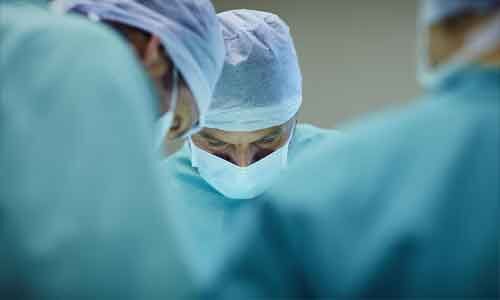- Home
- Medical news & Guidelines
- Anesthesiology
- Cardiology and CTVS
- Critical Care
- Dentistry
- Dermatology
- Diabetes and Endocrinology
- ENT
- Gastroenterology
- Medicine
- Nephrology
- Neurology
- Obstretics-Gynaecology
- Oncology
- Ophthalmology
- Orthopaedics
- Pediatrics-Neonatology
- Psychiatry
- Pulmonology
- Radiology
- Surgery
- Urology
- Laboratory Medicine
- Diet
- Nursing
- Paramedical
- Physiotherapy
- Health news
- Fact Check
- Bone Health Fact Check
- Brain Health Fact Check
- Cancer Related Fact Check
- Child Care Fact Check
- Dental and oral health fact check
- Diabetes and metabolic health fact check
- Diet and Nutrition Fact Check
- Eye and ENT Care Fact Check
- Fitness fact check
- Gut health fact check
- Heart health fact check
- Kidney health fact check
- Medical education fact check
- Men's health fact check
- Respiratory fact check
- Skin and hair care fact check
- Vaccine and Immunization fact check
- Women's health fact check
- AYUSH
- State News
- Andaman and Nicobar Islands
- Andhra Pradesh
- Arunachal Pradesh
- Assam
- Bihar
- Chandigarh
- Chattisgarh
- Dadra and Nagar Haveli
- Daman and Diu
- Delhi
- Goa
- Gujarat
- Haryana
- Himachal Pradesh
- Jammu & Kashmir
- Jharkhand
- Karnataka
- Kerala
- Ladakh
- Lakshadweep
- Madhya Pradesh
- Maharashtra
- Manipur
- Meghalaya
- Mizoram
- Nagaland
- Odisha
- Puducherry
- Punjab
- Rajasthan
- Sikkim
- Tamil Nadu
- Telangana
- Tripura
- Uttar Pradesh
- Uttrakhand
- West Bengal
- Medical Education
- Industry
Sitagliptin may not control blood sugar during bypass surgery in diabetics: Study

USA: Perioperative administration of sitagliptin in diabetes patients undergoing bypass surgery does not prevent hyperglycemia or complications, finds a recent study in the journal Diabetes, Obesity and Metabolism. The sitagliptin therapy, however, reduced daily insulin requirements when the patient shifted to regular ward.
Guillermo E Umpierrez, Department of Medicine, Emory University, Atlanta, Georgia, and colleagues assessed whether sitagliptin treatment before surgery and during the hospital stay can help in preventing and reducing the severity of perioperative hyperglycemia in type 2 diabetes (T2D) patients undergoing coronary artery bypass graft (CABG) surgery.
For the purpose, the researchers conducted a double‐blinded, placebo‐controlled trial in 182 adults with T2D. They were randomly assigned to receive sitagliptin (n=91) or matching placebo (n=91) starting 1 day prior to surgery and continued during the hospital stay.
The primary outcome was difference in the proportion of patients with postoperative hyperglycaemia (blood glucose [BG] > 10 mmol/L [>180 mg/dL]) in the intensive care unit (ICU). Secondary endpoints included differences in mean daily BG in the ICU and after transition to regular wards, hypoglycaemia, hospital complications, length of stay and need of insulin therapy.
Key findings of the study include:
- There were no differences in the number of patients with postoperative BG greater than 10 mmol/L, mean daily BG in the ICU or after transition to regular wards, hypoglycaemia, hospital complications or length of stay.
- There were no differences in insulin requirements in the ICU; however, sitagliptin therapy was associated with lower mean daily insulin requirements (21.1 ± 18.4 vs. 32.5 ± 26.3 units) after transition to a regular ward compared with placebo.
"Our findings indicate that the use of sitagliptin, prior to surgery and continued during hospital stay, did not reduce the frequency of perioperative hyperglycaemia or hospital complications in patients with type 2 diabetes after cardiac surgery," concluded the authors.
"Sitagliptin for the prevention and treatment of perioperative hyperglycaemia in patients with type 2 diabetes undergoing cardiac surgery: A randomized controlled trial," is published in the journal Diabetes, Obesity and Metabolism.
DOI: https://dom-pubs.onlinelibrary.wiley.com/doi/10.1111/dom.14241
Dr Kamal Kant Kohli-MBBS, DTCD- a chest specialist with more than 30 years of practice and a flair for writing clinical articles, Dr Kamal Kant Kohli joined Medical Dialogues as a Chief Editor of Medical News. Besides writing articles, as an editor, he proofreads and verifies all the medical content published on Medical Dialogues including those coming from journals, studies,medical conferences,guidelines etc. Email: drkohli@medicaldialogues.in. Contact no. 011-43720751


